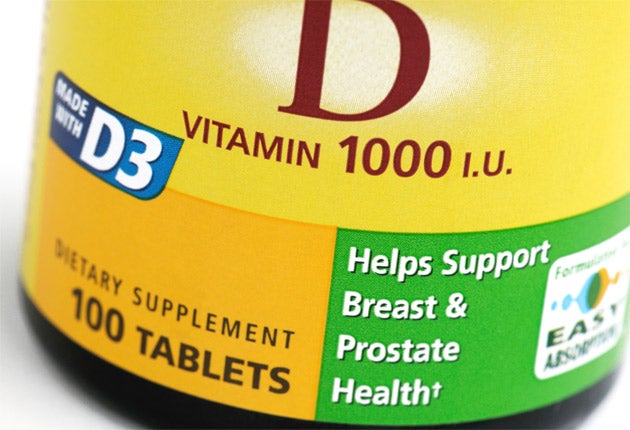Vitamin D, the cure-all supplement that could be bad for your health

It is called "bottled sunshine" and claimed to be one of the most effective health supplements on the market. Scores of studies have suggested that it protects against heart disease, cancer, diabetes, high blood pressure, schizophrenia and multiple sclerosis, and a growing number of doctors have recommended it to their patients.
But vitamin D, it turns out, has been oversold. After reviewing more than 1,000 research papers, the authoritative Institute of Medicine in the US has concluded that the high levels often recommended are unnecessary and could even be harmful.
Over recent years the idea that everyone needs extra vitamin D has swept countries on both sides of the Atlantic as scientists and doctors, convinced by the growing body of evidence of the nutrient's role in a range of diseases, have advocated supplements.
Vitamin D is made naturally in the body from sunlight, which is its main source. It is also found in limited quantities in some foods such as fish and fortified breakfast cereals. As much as half the population is said to have less than optimum levels.
The gloomy weather and long winter in countries north of 30 degrees latitude, such as the UK, means that a large part of the earth's population is deficient between October and March.
In the US, sales of vitamin D supplements soared 80 per cent in 2008-09 to $430m (£270m). In 2001 they stood at $40m. Requests for blood tests for vitamin D levels from one company, Quest Diagnostics, surged 50 per cent in the fourth quarter of 2009 alone.
But according to the IoM, the excitement got ahead of the science. Dennis Black, professor of epidemiology at the University of California and an author of the report, said: "Everyone was hoping vitamin D would be kind of a panacea. The number of vitamin D tests has exploded."
The IoM has now sought to quell the craze. The 14-member expert committee, convened at the request of the US and Canadian governments, was widely expected to increase the recommended blood level of the vitamin, last set in 1997 and based on what was necessary for bone health. Vitamin D is essential for building bones and deficiency in children causes rickets.
Experts had said that the emerging evidence of its role in other diseases meant that the recommended blood level should be increased. But the IoM has rejected the evidence and said that most people are getting enough of the vitamin from sunlight and diet.
"This review found that information about the health benefits [of vitamin D] beyond bone health were from studies that provided often mixed and inconclusive results and could not be considered reliable," the committee said. They recommend people need 600 international units a day (800 a day over age 70) and warn that doses above 4,000 units a day may be harmful. Vitamin D supplements containing 5,000 units per pill are widely available in the US, and can also be bought in the UK.
"Very high levels of vitamin D (above 10,000 IUs per day) are known to cause kidney and tissue damage. Some preliminary studies offer tentative signals about adverse health effects [at lower levels]", they add.
Oliver Gillie, of the UK Health Research Forum, said there was a greater need for vitamin D supplementation in the UK because of our poorer weather and fewer vitamin D enriched foods.
"American adults are already getting about 300 international units from sun and fortified milk and orange juice, whereas in the UK we get an average of only 150 IUs per day from all sources. So this means we need to take 450 IUs per day to fall in line with the IoM recommendation," he said.
Subscribe to Independent Premium to bookmark this article
Want to bookmark your favourite articles and stories to read or reference later? Start your Independent Premium subscription today.

Join our commenting forum
Join thought-provoking conversations, follow other Independent readers and see their replies